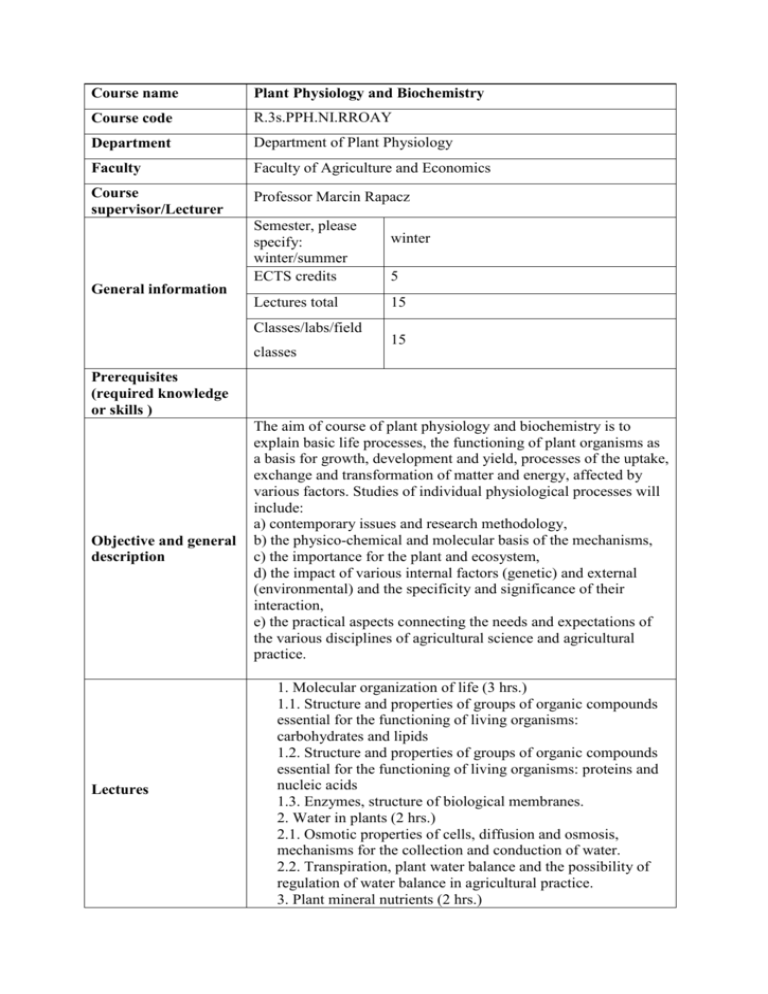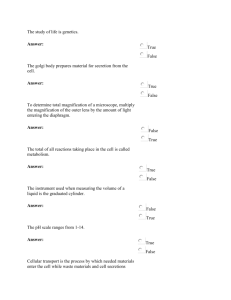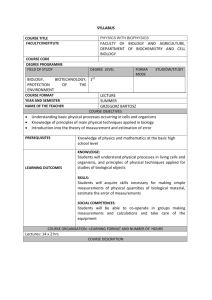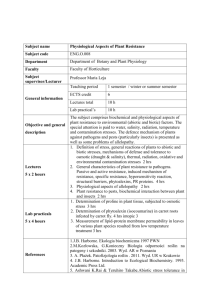Course name
advertisement

Course name Plant Physiology and Biochemistry Course code R.3s.PPH.NI.RROAY Department Department of Plant Physiology Faculty Faculty of Agriculture and Economics Course supervisor/Lecturer Professor Marcin Rapacz General information Semester, please specify: winter/summer ECTS credits Lectures total Classes/labs/field classes winter 5 15 15 Prerequisites (required knowledge or skills ) Objective and general description Lectures The aim of course of plant physiology and biochemistry is to explain basic life processes, the functioning of plant organisms as a basis for growth, development and yield, processes of the uptake, exchange and transformation of matter and energy, affected by various factors. Studies of individual physiological processes will include: a) contemporary issues and research methodology, b) the physico-chemical and molecular basis of the mechanisms, c) the importance for the plant and ecosystem, d) the impact of various internal factors (genetic) and external (environmental) and the specificity and significance of their interaction, e) the practical aspects connecting the needs and expectations of the various disciplines of agricultural science and agricultural practice. 1. Molecular organization of life (3 hrs.) 1.1. Structure and properties of groups of organic compounds essential for the functioning of living organisms: carbohydrates and lipids 1.2. Structure and properties of groups of organic compounds essential for the functioning of living organisms: proteins and nucleic acids 1.3. Enzymes, structure of biological membranes. 2. Water in plants (2 hrs.) 2.1. Osmotic properties of cells, diffusion and osmosis, mechanisms for the collection and conduction of water. 2.2. Transpiration, plant water balance and the possibility of regulation of water balance in agricultural practice. 3. Plant mineral nutrients (2 hrs.) 3.1. The role of individual minerals, physiological mechanisms for collection and transport of ions. 3.2. Effect of external factors on mineral uptake, laws governing the mineral nutrition of plants. 4. Photosynthesis (2 hrs.) 4.1. The mechanism of photosynthesis and its modifications in different plants. 4.2. Ecology of photosynthesis and assimilate translocations 5. Anabolism and catabolism of carbohydrates, proteins and fats, respiratory processes (4 hrs.) 5.1. The processes of degradation of sugars – cellular respiration. 5.2. Biosynthesis and catabolism of lipids and fatty acids. 5.3. Mechanisms of regulation of metabolic processes and energy transfer. 5.4. Biosynthesis of nitrogen containing compounds (aminoacids, nucleotides, proteins, nucleic acids). 6. Plant growth and development (2 hrs.) 6.1. Plant growth regulators 6.2. Developmental signals, regulation of morphogenesis Classes Laboratory classes (15 hrs.): 1. Structural biochemistry – quantitative, qualitative and functional analysis (7 hrs.) 1.1. Carbohydrates. 1.2. Lipids. 1.3. Amino acids. 1.4. Proteins. 1.5. Enzymes. 1.6. Nucleic acids. 1.7. Photosynthetic dyes. 2. Water in plants (2 hrs.) 2.1. Osmotic processes. 2.2. Collection and transport of water; Transpiration. 3. Mineral nutrients (1 hr.) :Plant growth on a medium full and on media devoid of individual elements, deficiency symptoms; The antagonism of ions; Effects of salinity and pH of the substrate on plant growth. 4. Photosynthesis (2 hrs.): 4.1. Fluorescence measurements of photosynthetic activity of the light phase; 4.2. Methods of photosynthesis measurements in terrestrial plants. 5. Plant growth and development (3 hrs.) 5.1. Comparative analysis of plant growth; Determination of plant growth zones; The effects of external factors and plant hormones on growth. 5.2. Plant movements 5.3. Reasons and methods for breaking seed dormancy; Effect of vernalization on generative development of plants; Effect of day length on plant growth on the long and short day. Assessment method Specify: oral/written examination References Classes: a / evaluation of the quality of laboratory work (included analytical skills, correctness and accuracy of measurement, collaboration with other students), each classes rated as 0 or 1 b / evaluation of laboratory reports including quality of data analysis, and interpretation), each report rated as 0 to 4 Overall rating: (a + b) for each classes/number of classes Lectures: written test exam (about 45 questions from the entire range of the subject with four response options), 0 or 1 pt. for each question Taiz L., Zeigler E. „Plant Physiology”








